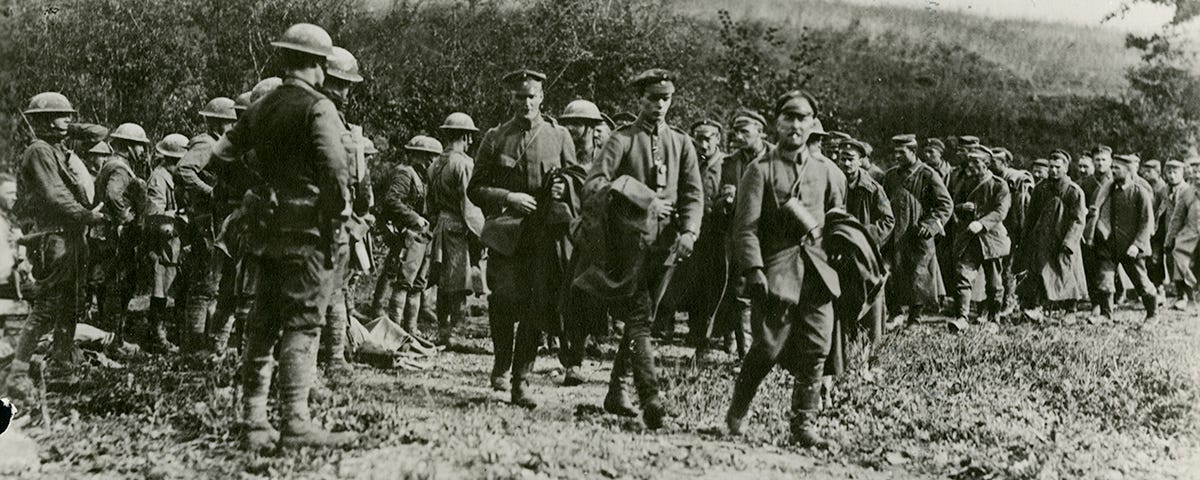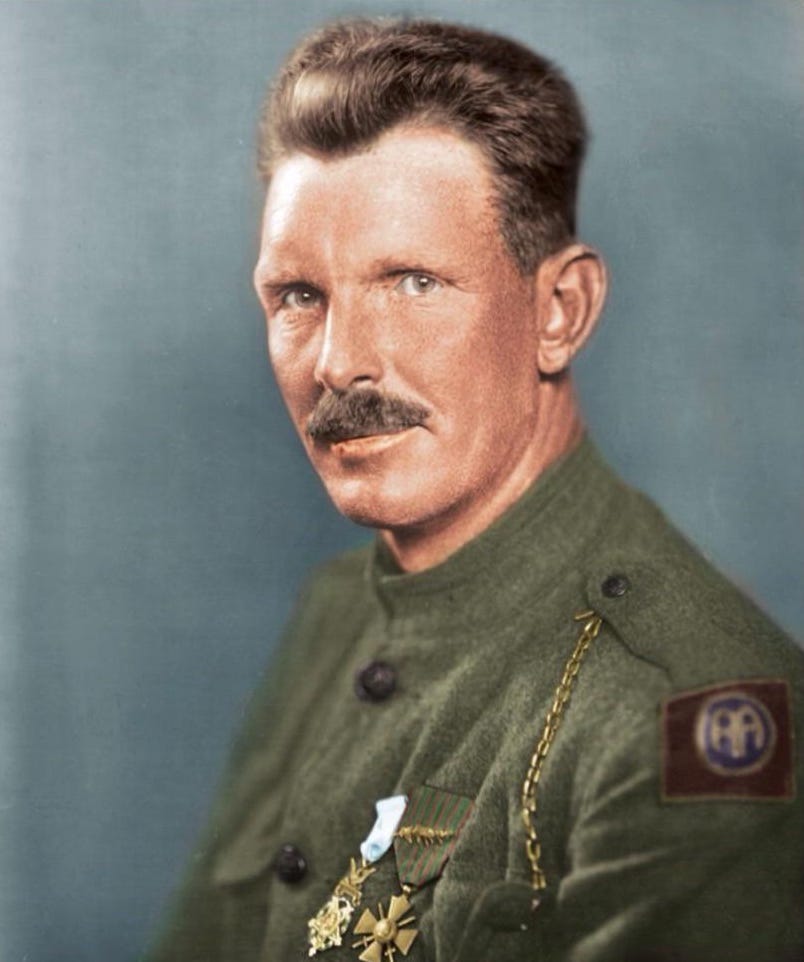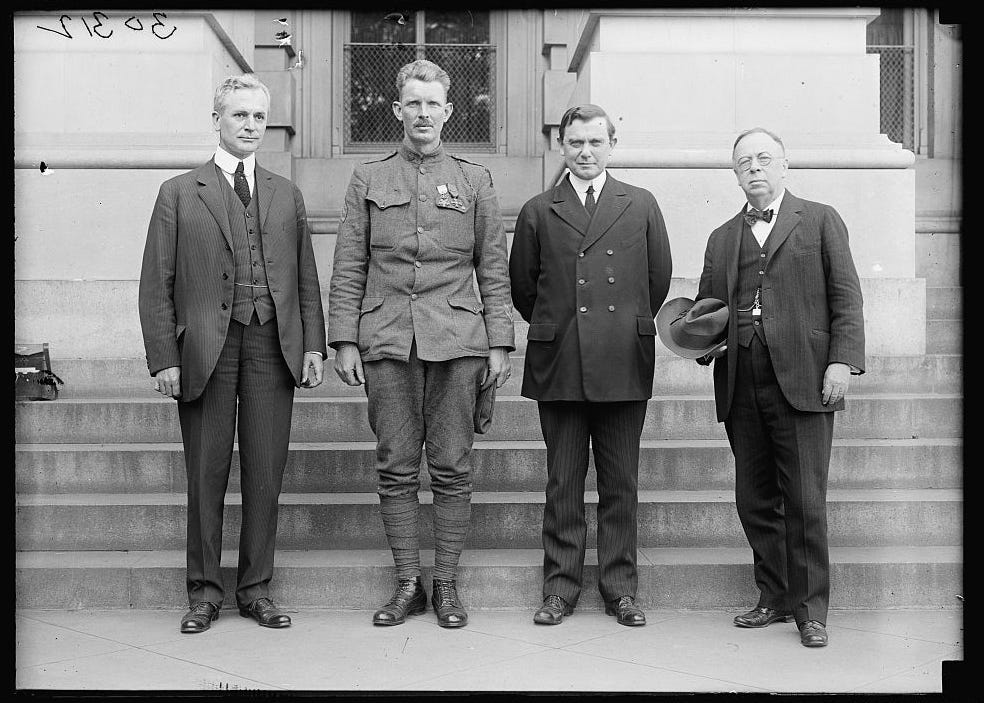October 8 - Mountain Man to War Hero: Sgt. York's Spectacular WWI Exploits
Faith Empowers Courage Against Overwhelming Odds
This is the day Sgt. Alvin York almost single-handedly captured 132 German soldiers during World War I in 1918.
In today's lesson, we will explore the extraordinary courage of Sgt. Alvin York during World War I and how his unwavering faith enabled him to overcome seemingly insurmountable odds. How can we cultivate such faith in our own lives? What does it mean to truly believe that if God is for us, no one can stand against us?
"What, then, shall we say in response to these things? If God is for us, who can be against us?" - Romans 8:31 (NIV)
This Date in History
In the fog-shrouded Argonne Forest of France, on October 8, 1918, a reluctant soldier from the mountains of Tennessee would perform an act of valor so extraordinary that it would echo through the pages of military history. Corporal Alvin C. York, a former conscientious objector, found himself in command of a small detachment tasked with silencing German machine guns that were decimating his battalion. What transpired next would transform this humble farmer into an American legend.
Alvin York was born in 1887 in a two-room log cabin in Pall Mall, Tennessee, the third of eleven children. Growing up in poverty, York became an expert marksman, hunting to help feed his family. Before the war, he worked as a semi-professional hunter and a railroad construction laborer. York was also a devout Christian, belonging to the Church of Christ in Christian Union, which opposed all forms of violence.
When the United States entered World War I, York was drafted into the army. He initially claimed conscientious objector status due to his religious beliefs. However, after discussions with his pastor and military superiors about the Bible's view on war and the necessity of fighting for liberty, York had a change of heart. He famously told his battalion commander, "I'm staying in the army. I think Uncle Sam's right."
On that fateful October morning, York's patrol of 17 men set out to infiltrate the German lines and silence the machine guns. As they advanced, they encountered a larger force of Germans and were quickly pinned down. In the ensuing firefight, six Americans were killed, and three were wounded, leaving York effectively in command of the remaining seven men.
York found himself in an exposed position on the crest of a hill, facing a German machine gun nest. Drawing on his sharpshooting skills, he began picking off the German gunners with deadly accuracy. As the Germans realized the threat, a group of six charged at York with fixed bayonets. York, unfazed, shot all six before they could reach him, starting with the last man in line so the ones in front wouldn't notice their comrades falling.
The German commander, astounded by York's marksmanship, offered to surrender if York would stop shooting. York agreed, and to his amazement, 132 German soldiers, including four officers, emerged from their positions to lay down their arms. York and his seven remaining men marched the prisoners back to American lines, gathering more surrendering Germans along the way.
York's incredible feat earned him the Medal of Honor, America's highest military decoration, along with promotions and numerous other awards, including the French Croix de Guerre. His story captivated the American public, making him one of the war's most celebrated heroes.
After the war, York returned to Tennessee, refusing lucrative offers to capitalize on his fame. Instead, he focused on improving educational opportunities in his rural community. He established the Alvin C. York Institute in 1926, a private agricultural and industrial school, which continues to operate today as a public high school.
York's life after the war was not without challenges. He struggled with war-related health issues and financial difficulties. Despite these hardships, he remained committed to public service, working on various projects to benefit his community and veterans.
During World War II, York, though past military age and in poor health, attempted to reenlist but was denied. Instead, he served as president of his local draft board and traveled the country on war bond drives. He also worked to establish a Bible school and served on the Tennessee State Park and Forestry Commission.
The 1941 film "Sergeant York," starring Gary Cooper, immortalized York's wartime exploits and brought his story to a new generation. York initially opposed the film but eventually agreed to it on the condition that the proceeds would go toward creating an interdenominational Bible school.
Alvin York passed away in 1964, leaving behind a legacy of courage, faith, and service. His actions on that October day in 1918 not only changed the course of a battle but also provided a powerful example of how ordinary individuals can rise to extraordinary heights in the face of extreme circumstances. Today, York's home in Pall Mall is a state historic site, preserving the memory of this remarkable American hero.
Historical Context
Alvin York's remarkable actions on October 8, 1918, occurred during the final months of World War I, a conflict that had engulfed much of the world since 1914. The United States had entered the war in April 1917, and by late 1918, American forces were playing a crucial role in the Allied push to end the conflict.
The Meuse-Argonne Offensive, where York's heroism unfolded, represented a pivotal moment in the war. This massive operation, lasting from September 26 to November 11, 1918, was the largest in United States military history, involving 1.2 million American soldiers. It formed a critical part of the coordinated Allied strategy to break through the formidable German Hindenburg Line and force Germany's surrender.
At the time, the American Expeditionary Forces (AEF) were still relatively new to the conflict. Many American soldiers, like York, were experiencing their first major combat operations. The AEF was led by General John J. Pershing, who insisted on maintaining an independent American force rather than integrating his troops into existing British and French units.
The war had introduced new and terrifying weapons, including machine guns, poison gas, and tanks. The machine gun, in particular, had changed the nature of warfare, making defensive positions extremely difficult to overcome and contributing to the stalemate that characterized much of the war.
In the United States, the war effort had led to significant social and economic changes. The government had introduced conscription, rationing, and war bonds. Women were entering the workforce in unprecedented numbers to fill the gaps left by men serving in the military. The war also accelerated technological development, particularly in areas like aviation and communications.
The conflict had a profound impact on American society, challenging traditional notions of isolationism and propelling the United States onto the world stage as a major power. It also raised complex moral and ethical questions for many Americans, as exemplified by York's initial struggle with his pacifist beliefs.
As the Meuse-Argonne Offensive began, there was a sense that the war might finally be nearing its end. The German army, while still formidable, was showing signs of strain after four years of conflict. Allied victories earlier in 1918 had boosted morale, but the fighting remained intense and costly. It was in this context of a final, desperate push to end the war that Alvin York and countless other soldiers found themselves tested to their limits.

Did You Know?
Despite his heroics, York remained humble about his actions. He often credited divine intervention, saying, "A higher power than man guided and watched over me and told me what to do."
Today’s Reflection
Throughout history, stories of extraordinary courage in the face of overwhelming odds have captivated our imagination. Tales like David facing Goliath or Sergeant Alvin York single-handedly capturing 132 German soldiers stir something deep within us. They challenge us to consider: What would we do in such situations? Where does such bravery come from?
The apostle Paul provides a powerful answer in Romans 8:31: "If God is for us, who can be against us?" This declaration isn't just a comforting platitude; it's a bold statement of faith that has empowered believers throughout history to stand firm against seemingly insurmountable challenges.
Consider young David, a shepherd boy facing a battle-hardened giant. Logic would dictate retreat, yet David advanced with unwavering confidence. His secret? An unshakeable belief that God was with him. "You come against me with sword and spear and javelin, but I come against you in the name of the Lord Almighty," David proclaimed to Goliath (1 Samuel 17:45). His faith transformed a potentially deadly confrontation into a moment of divine victory.
Fast forward to the fog-shrouded Argonne Forest in 1918. Sergeant Alvin York, a once-reluctant soldier, found himself in a situation that would test the limits of his courage and faith. Surrounded by enemy fire, his comrades fallen around him, York could have surrendered to fear. Instead, he chose to trust in a power greater than himself.
York's own words echo David's confidence: "I'm a witness to the fact that God did help me out of that hard battle; for the bushes were shot off all around me and I never got a scratch." Like David, York's faith allowed him to see beyond the immediate danger to the God who was with him.
These stories remind us that true courage isn't the absence of fear, but rather the presence of faith. It's the conviction that no matter how dire the circumstances, we are never truly alone or outmatched when we stand with God.
But let's be clear: this isn't a call to reckless action or blind faith. Both David and York were skilled in their respective areas - David with his sling, York with his marksmanship. They combined their God-given talents with unwavering trust in divine guidance. This teaches us that faith and preparation go hand in hand.
In our daily lives, we may not face literal giants or enemy soldiers, but we often encounter situations that feel just as daunting. It might be a challenging job, a difficult relationship, or a personal struggle that seems too big to overcome. In these moments, Paul's words resonate: "If God is for us, who can be against us?"
This doesn't mean life will be easy or that victory is guaranteed in every earthly endeavor. Rather, it's an assurance that in every trial, every challenge, we have a God who is with us and for us. This truth empowers us to face our "giants" with courage, knowing that the outcome isn't solely dependent on our own strength.
As we reflect on the stories of David, York, and countless others who have stood firm in faith, let's be encouraged to face our own challenges with renewed courage. Let's remember that with God on our side, we are never truly outnumbered or overpowered. In Him, we find the strength to stand firm, to persevere, and to overcome.
Practical Application
Identify a challenging situation in your life where you feel outnumbered or overwhelmed. Write it down, then next to it, write "God is for me." Each time you face this challenge, consciously remind yourself of this truth. Practice viewing your situation through the lens of faith, asking yourself, "How might God be working in this situation?" Take one small, faith-filled action towards addressing this challenge, trusting that God is with you.
Closing Prayer
Heavenly Father, we thank You for the examples of faith and courage You've given us throughout history. Like Alvin York and David, help us to stand firm in our faith when faced with overwhelming odds. Remind us daily that if You are for us, nothing can truly stand against us. Grant us the wisdom to prepare ourselves and the courage to trust in Your guidance. In moments of doubt or fear, strengthen our faith and help us to see Your hand at work. May we face each challenge with the confidence that comes from knowing You are always with us. In Jesus' name, we pray. Amen.
Supplementary Study
"Be on your guard; stand firm in the faith; be courageous; be strong."
This verse encapsulates the essence of our lesson, encouraging believers to maintain vigilance, steadfastness, and courage in their faith, much like Alvin York did in his moment of trial.
"The Lord is my light and my salvation—whom shall I fear? The Lord is the stronghold of my life—of whom shall I be afraid?"
This psalm reflects the confidence that comes from trusting in God, mirroring the fearlessness displayed by both David against Goliath and York in the face of overwhelming odds.
"So do not fear, for I am with you; do not be dismayed, for I am your God. I will strengthen you and help you; I will uphold you with my righteous right hand."
This powerful promise from God aligns perfectly with our theme, reassuring us of God's presence and support when we face daunting challenges, just as He was with York in the heat of battle.
Final Thoughts
The story of Alvin York reminds us that extraordinary faith can lead to extraordinary outcomes. When we stand firm in our beliefs, trusting in God's presence and power, we can face any challenge with courage. York's experience, much like David's confrontation with Goliath, teaches us that it's not about the size of the obstacle, but the size of our faith. As we navigate our own battles, let's remember that with God on our side, we are never truly outnumbered or overpowered. May we, like York, be willing to step forward in faith, knowing that God goes before us in every situation.
Community Engagement
Share your thoughts or use these questions to get the conversation started.
What aspects of Alvin York's story do you find most inspiring or relatable?
How have you experienced God's presence in overwhelming situations in your own life?
In what ways can we cultivate the kind of faith that empowers us to face our "giants" with courage?
How might York's initial struggle with his pacifist beliefs inform our understanding of faith and duty?
This devotional is free to read. You can support this publication by becoming a subscriber, upgrading to paid subscriber status, liking this post, commenting, and/or sharing this post with anyone who might enjoy it.
In tomorrow's lesson, we'll venture into uncharted territories of faith, exploring how to stand firm when surrounded by the unfamiliar. How do we navigate a world that often feels foreign to our beliefs, and what unexpected discoveries await us in our journey?
Below is bonus content currently available to all subscribers. Enjoy!
Bonus - Did You Know?
Alvin York grew up in a family of blacksmiths and farmers, and before the war, he was known locally as an exceptional marksman and skilled hunter.
York's unit, the 82nd Division, was nicknamed the "All American" Division because it had soldiers from all 48 states.
The terrain where York's famous action took place was so remote and difficult that it wasn't until 2006 that researchers definitively identified the exact location.
York initially refused to authorize a film about his life, concerned it might appear he was profiting from the war. He only agreed when assured that the proceeds would go towards founding a Bible school.
After the war, York turned down offers that could have made him a millionaire, including a $250,000 offer to star as himself in a film adaptation of his story.
York suffered from health problems related to his war service, including exposure to chemical weapons, which contributed to his financial struggles later in life.
Despite his fame, York remained committed to his rural roots, refusing to move from his hometown of Pall Mall, Tennessee, even as he worked on national stages to improve education and infrastructure in rural areas.
York's marksmanship skills were so renowned that during his training, he consistently hit targets that his fellow soldiers couldn't even see.
After the war, York became an advocate for veterans' rights and was instrumental in establishing the Tennessee State Veterans Home.
York's Medal of Honor citation initially credited him with capturing 25 machine guns, but he personally requested it be corrected to 35, which was the actual number.
Additional Resources
Sergeant York: His Own Life Story and War Diary - Alvin York
Alvin York: A New Biography of the Hero of the Argonne - Douglas V. Mastriano
World War I: The Definitive Visual History - R.G. Grant
To End All Wars: A Story of Loyalty and Rebellion, 1914-1918 - Adam Hochschild










It's been a while since I read Alvin York's amazing story. Thanks for the applications of combining preparation with faith.
Thank you for reminding us that America once had great heroes and Alvin York was one of them.